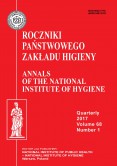Rocz Panstw Zakl Hig 2012, 63(2): 225-231
Stan wiedzy na temat produktów mięsnych jako głównego źródła sodu w diecie wśród lubelskich studentów.
[Level of knowledge on the meat products as the main sources of sodium in the diet among the students of Lublin]
STRESZCZENIE
Wprowadzenie. Sól kuchenna stanowi główne źródło sodu w diecie, jednak zbyt wysoka jego podaż może stanowić źródło poważnych zagrożeń zdrowotnych. Znajomość przez studentów zawartości soli w produktach spożywczych oraz umiejętność komponowania diety o odpowiedniej zawartości sodu może mieć kluczowe znaczenie dla zdrowia i jakości życia w późniejszym wieku.
Cel. Ocena poziomu wiedzy studentów lubelskich uczelni na temat technologicznej i fizjologicznej roli soli oraz znajomości jej źródeł w codziennej diecie, ze szczególnym uwzględnieniem produktów mięsnych.
Materiał i metoda. Badania przeprowadzono metodą wywiadu z autorskim kwestionariuszem ankiety w grudniu 2010 roku wśród lubelskich studentów. W badaniu udział wzięło 200 studentów: 88 kobiet i 77 mężczyzn. Do analizy wykorzystano 165 poprawnie wypełnionych ankiet.
Wyniki. Wyniki badań wykazały, że studenci różnych kierunków studiów, zarówno związanych jak i niezwiązanych z produkcją i oceną żywności oraz z żywieniem człowieka, mają niską wiedzę na temat technologicznej i fizjologicznej roli soli oraz w małym stopniu znają jej źródła w codziennej diecie. Trzy czwarte studentów uczestniczących w badaniach nie orientowała się ile wynosi średnie dzienne spożycie soli przez Polaków, a ponad 80% nie znała zalecanej normy spożycia tego składnika. Około 50% badanych potrafiła podać przykłady artykułów żywnościowych będących głównym źródłem soli w diecie. Niespełna jedna czwarta ankietowanych osób uważała, że produkty mięsne są najpoważniejszym źródłem soli w diecie.
Wnioski. Poziom wiedzy badanych studentów na temat technologicznej i fizjologicznej roli soli oraz znajomość jej źródeł w codziennej diecie były na niskim poziomie. Większość studentów nie znała zalecanej normy spożycia soli. Badana grupa studentów potrafiła wskazać grupy produktów stanowiących główne źródło soli w codziennej diecie. Studenci nie wykorzystywali posiadanej wiedzy na temat soli w sposobie odżywiania.
ABSTRACT
Background. Salt is one of the most commonly used spice. However, too high and too frequent supply of this component may be a source of serious health risks. Knowledge of the salt content in food products and the ability to compose a diet with adequate sodium content are crucial to their health and quality of life.
Objective. To assessment of the level of knowledge of the Lublin University students on technological and physiological role of salt and its sources in the diet, particularly meat products.
Material and Method. The study by interview with the author’s questionnaire survey conducted in December 2010 among Lublin students. In the study participated 200 students (88 women and 77 men). For the analysis 165 correctly completed questionnaires were used.
Results. The results showed that the knowledge of students involved in the production and evaluation of food and human nutrition on the physiological role of technology and knowledge of the sources of salt and salt in the diet, particularly meat products, is at a low level, comparable to the knowledge of students of non-food lines. Three quarters of students do not realize how much is the average daily intake of salt, and more than 80% do not know the recommended norm of consumption of this ingredient. Approximately 50% of respondents could correctly give examples of foods that are the main source of salt in the diet. However, only less than one quarter of them, although often eat meat products is not aware that it is these products are the most serious source of salt.
Conclusions. The knowledge of students about the technology and physiological role of salt and its sources in the diet was low. Most students were not familiar with the recommended daily intake for the salt. The study students identified groups of food products as the main source of salt in the diet. However, they did not used their knowledge in the mode of nutrition.
Liczba pobrań: 2126


